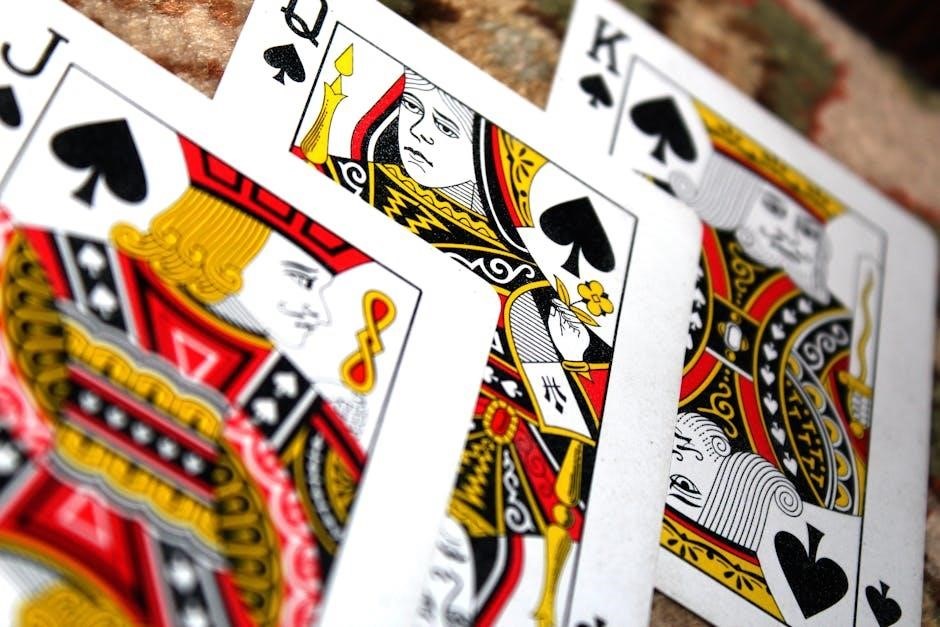Playing card game rules provide the foundation for engaging gameplay, covering setup, dealing, and turn-based mechanics. Understanding these guidelines enhances enjoyment and strategic play across various card games;
Overview of Popular Card Games
Popular card games like UNO, Pokémon Trading Card Game (TCG), Yu-Gi-Oh!, and Euchre offer unique experiences with distinct rules and strategies. UNO is known for its fast-paced, color-matching mechanics and special action cards like “Skip” and “Wild Draw 4.” The Pokémon TCG focuses on deck-building and strategic turn-based battles, with players using cards to summon Pokémon and attack opponents. Yu-Gi-Oh! introduces advanced rules, including summoning powerful monsters and activating traps. Euchre, a trick-taking game, emphasizes teamwork and trump cards, ideal for four players in two teams. These games cater to different preferences, from casual fun to competitive play, making them enduring favorites among card game enthusiasts worldwide.
Importance of Understanding Rules for Strategic Play
Understanding the rules of playing card games is essential for strategic play and ensuring a fair, enjoyable experience for all participants. Clear knowledge of gameplay mechanics, such as turn sequences, card values, and special actions, allows players to make informed decisions and maximize their chances of winning. For example, in UNO, knowing when to use “Skip” or “Wild Draw 4” cards can drastically change the game’s outcome. Similarly, in the Pokémon Trading Card Game, understanding deck-building rules and turn actions is critical for executing effective strategies. Misunderstanding rules can lead to penalties or disputes, undermining the game’s integrity. Thus, mastering the rules is not only a matter of etiquette but also a key competitive advantage, enabling players to adapt and thrive in diverse card game scenarios.

Basic Rules of Playing Card Games
Basic rules include card dealing, playing sequences, and winning conditions. Players must follow turn order, match cards by value or suit, and use special cards strategically.

Setup and Initial Dealing of Cards
The setup for most card games begins with shuffling the deck and dealing a specific number of cards to each player. For example, in UNO, each player receives seven cards, while in Pokémon TCG, players draw seven cards from their deck. The remaining cards form the draw pile, with the top card often determining the starting suit or action, as seen in games like Euchre. Proper dealing ensures fairness and prepares players for turn-based gameplay. Some games, like Yu-Gi-Oh!, involve additional steps, such as setting aside cards for the Deck or Extra Deck. Understanding the initial dealing process is crucial for a smooth and enjoyable gaming experience across various card games.
Turn-Based Gameplay Mechanics
Turn-based gameplay mechanics dictate the sequence of play, ensuring fair participation and strategic decision-making. In most card games, players take turns in a clockwise or counterclockwise order, starting with the player to the left of the dealer. Each turn typically involves drawing a card from the deck and performing an action, such as playing a card from their hand. For example, in UNO, a player must match the color or number of the top card on the discard pile, while in Pokémon TCG, players can summon Pokémon or use abilities. Action cards, like Skip or Draw 2 in UNO, can alter the turn order or force opponents to draw additional cards. Proper adherence to turn-based rules ensures smooth gameplay and maintains the integrity of the game.
Common Card Values and Special Cards
Playing card games often involve standardized card values and special cards that add complexity and strategy; Numbered cards typically represent their face value, while face cards like Jack, Queen, and King may have specific point values or functions. Special cards, such as Wild, Wild Draw 4 in UNO, or Action Cards in Yu-Gi-Oh!, introduce unique mechanics that can alter gameplay. For example, Wild cards allow players to change the color of play, while Action Cards in Pokémon TCG enable special abilities like healing or disrupting opponents. In Euchre, certain cards like the Jack of the trump suit hold higher value. Understanding these card values and special functions is crucial for mastering gameplay and executing effective strategies across various card games. Proper use of special cards can turn the tide of a game in a player’s favor.

Popular Card Games and Their Specific Rules

Popular card games like UNO, Pokémon TCG, Yu-Gi-Oh!, and Euchre offer unique rules and mechanics, enhancing gameplay with special cards and strategic depth.
UNO: Special Cards and Action Mechanics

UNO features a variety of special cards that add excitement and strategy to the game. These include Skip, Reverse, Draw 2, Wild, and Wild Draw 4 cards. Skip and Reverse cards disrupt opponents’ turns, while Draw 2 and Wild Draw 4 force opponents to draw cards and skip their turn. Wild cards allow players to change the color of play, providing flexibility. Action mechanics enable sequential plays, such as playing another card immediately after a Skip or Draw 2. These elements create dynamic gameplay and require strategic thinking to outmaneuver opponents.
In two-player UNO, special rules like immediate card plays after certain actions enhance the pace and competitive nature of the game. Mastering these mechanics is key to achieving victory.
Pokémon Trading Card Game: Deck Building and Turn Actions
Building a competitive deck in the Pokémon Trading Card Game involves selecting 60 cards, including Pokémon, Energy, and Trainer cards. Each deck must include a 60-card minimum and follows specific rules to ensure balanced gameplay. During a turn, players start by drawing a card from their deck. If a player cannot draw a card at the beginning of their turn and has no cards left, they lose the game. Players can perform various actions, such as placing Basic Pokémon on the bench, attaching Energy cards to Pokémon, or using Trainer cards for strategic advantages. Each action must be taken in the correct sequence, and players can only perform one major action per turn, such as evolving a Pokémon or using an attack. Proper deck building and turn management are crucial for executing effective strategies and securing victories in competitive matches.

Yu-Gi-Oh!: Advanced Rules and Card Functions
Yu-Gi-Oh! features complex rules that govern card interactions and gameplay mechanics. Players begin with a 40-60 card deck, drawing five cards at the start. The field consists of zones like the Main Deck, Extra Deck, Graveyard, and Monster/Pendulum Zones. Monster cards can be summoned normally, tributed, or special summoned, while spell and trap cards activate under specific conditions. Pendulum monsters offer unique summoning mechanics, requiring a pendulum scale setup. Certain cards, like action cards, have special activation rules when drawn. Understanding these advanced rules is essential for strategic play, allowing players to maximize card effects and outmaneuver opponents. Proper use of card zones and adherence to summoning rules ensure fair and competitive gameplay.
Euchre: Trump Cards and Partner Strategies
Euchre is a trick-taking game played with a 24-card deck, primarily involving four players divided into two teams. The game revolves around declaring a trump suit, with the Jack of the chosen suit (the “right bower”) and the Jack of the opposite suit (the “left bower”) serving as the highest-ranking cards. Players must strategically communicate with their partner through card plays to maximize tricks. The dealer and their partner aim to win at least three tricks, while the opposing team seeks to prevent this. Effective teamwork and card management are crucial, as players must balance aggressive plays with defensive strategies to outmaneuver opponents. Understanding the hierarchy of trump cards and coordinating with your partner is key to success in this fast-paced, strategic game.
Advanced Strategies and Winning Conditions
Mastering advanced strategies involves optimizing card management, anticipating opponents’ moves, and leveraging special conditions. Winning often requires meeting specific criteria, such as accumulating points or depleting the deck strategically.
Card Management and Deck Optimization
Effective card management and deck optimization are critical for success in playing card games. Understanding card values, timing, and deck composition allows players to make strategic decisions. Techniques like tracking cards, predicting opponents’ moves, and resource management enhance gameplay. Deck optimization involves balancing card types, ensuring synergy, and adapting to game dynamics. Proper card management ensures players maintain control, minimize risks, and maximize opportunities. These strategies are essential for advancing in competitive play and achieving victory. By mastering these elements, players can improve their overall performance and adapt to various game scenarios effectively.

Special Conditions and Penalties in Various Games

Special conditions and penalties vary across card games, adding complexity and strategy. For instance, in UNO, failing to say “UNO” when holding one card results in drawing two cards as a penalty. In Pokémon TCG, certain conditions like Burn or Paralysis affect Pokémon, altering gameplay dynamics. Yu-Gi-Oh! imposes penalties for illegal moves, such as losing Life Points or having cards returned to the deck. In Euchre, failing to follow suit or naming trump incorrectly can lead to point deductions. These rules ensure fairness and challenge players to adapt their strategies. Understanding these specific conditions is crucial for mastering each game and avoiding unnecessary setbacks during play.

Mastering playing card game rules enhances gameplay and strategy. For detailed guides, visit official websites like UNO, Yu-Gi-Oh!, and Pokémon TCG for rulebooks and tutorials.
Where to Find Official Rulebooks and Guides
Official rulebooks and guides for popular card games are readily available online. Websites like UNO, Yu-Gi-Oh!, and Pokémon TCG provide detailed rulebooks and tutorials. These resources are essential for mastering gameplay mechanics, special card functions, and strategic tips.
Additionally, platforms like official card game forums and community websites offer comprehensive guides and FAQs. Many games also publish updated rulebooks in PDF formats, which can be downloaded directly from their official sites. For example, searching for “UNO official rules PDF” or “Pokémon TCG rulebook download” yields quick access to these resources. These guides are invaluable for both beginners and experienced players looking to refine their skills.
